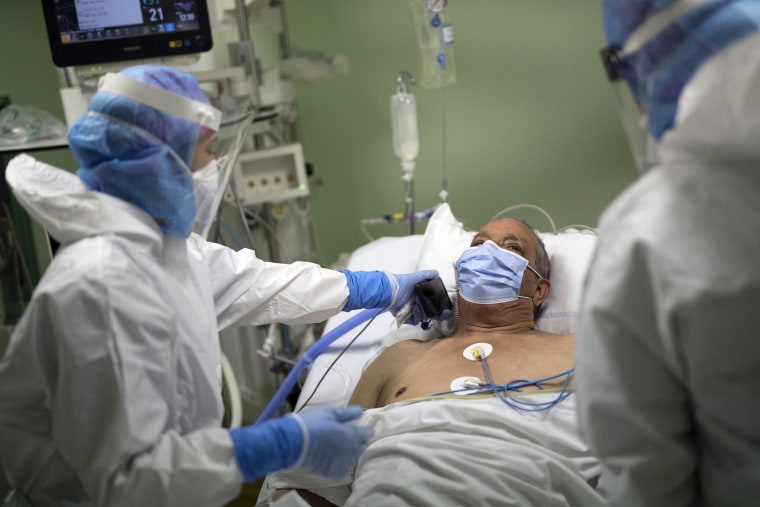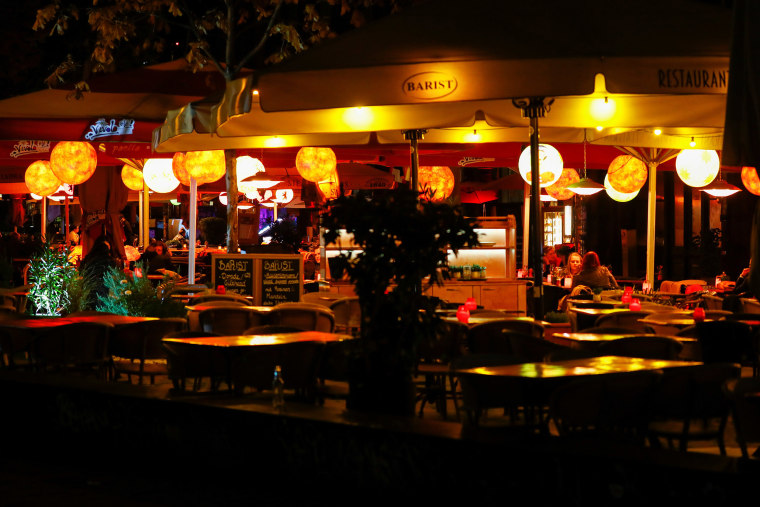LONDON — Surging coronavirus cases across Europe are triggering new national lockdowns as the continent again shows clear signs of becoming Covid-19's global epicenter.
After appearing to deal with the virus better than the United States for most of the summer, the European Union and its neighbors are now seeing more new cases per capita than the U.S. average. Daily recorded deaths per capita have caught up with the U.S. too, according to the European CDC.
The spiraling situation prompted French President Emmanuel Macron to announce a new national lockdown until Dec. 1.
"The virus is circulating at a speed that not even the most pessimistic forecasts had anticipated," he said in a televised speech. "Like all our neighbors, we are submerged by the sudden acceleration."
Macron warned 400,000 people could die if the virus was left unchecked, adding that more than half of the country's intensive care beds are already filled with Covid-19 patients.
Hours earlier, German Chancellor Angela Merkel announced her country — long seen as a relative coronavirus success story — would also enter a period of restrictions.
"We must act, and now, to avoid an acute national health emergency," she said, revealing she had wanted to act sooner but had faced opposition from Germany's regional leaders. “If we wait until the ICUs are full, then it will be too late," she said.
All bars and restaurants in Germany and France will now close — but unlike earlier lockdowns in spring, schools will remain open. France's measures go further and people are instructed to stay at home except for essential trips or medical treatment.

The moves put pressure on the United Kingdom to move from locally tailored restrictions and into a nationwide "circuit breaker" lockdown, which is being heavily resisted by Prime Minister Boris Johnson on economic grounds.
British cases are climbing sharply, with nearly 100,000 new infections a day, according to a study released Thursday by Imperial College London. That means the U.K. is faring worse than in the previous April peak, although a lack of testing meant the first peak was undercounted.
Johnson has placed the country into different zones — labeled tiers 1 - 3 — depending on their outbreak's severity. However his chief medical officer, Chris Whitty, raised eyebrows earlier this month when he said that the system "will not be sufficient" to slow infections.
Download the NBC News app for breaking news and politics
The development has caused frustration among some experts who warned that European nations should have spent the summer lull preparing for winter, and building effective "test, track and isolate" systems — something that continues to elude most governments.
Instead, many Europeans spent the warmer months vacationing. At times — with scenes of packed bars, a blithe approach to social distancing, and patchy masking-wearing across the continent — it was difficult to tell there had ever been a pandemic at all.
Now Europe could face a long, grim winter.

The World Health Organization said the European region — including Russia, Turkey, Israel and Central Asia — accounted for almost half of the 2.8 million new coronavirus cases last week.
There are few places not seeing a sharp uptick, even those that weathered spring fairly well, such as Greece and Norway.
Italy, one of the worst-hit in March, has closed theaters and swimming pools and ordered bars and restaurants to close at 6 p.m. In Spain, non-essential travel in and out of regional hotspots is now prohibited.
"We are deep in the second wave," European Commission President Ursula von der Leyen said. "I think that this year's Christmas will be a different Christmas."
